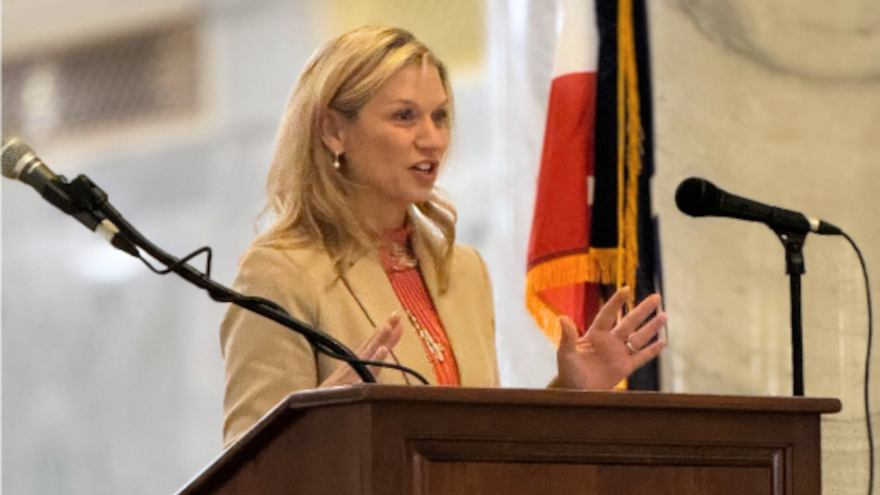FTC’s Holyoak discusses debt collection when recapping regulator’s activities to reduce fraud

Commissioner Melissa Holyoak represented the Federal Trade Commission last week at the Freedom from Fraud event presented to Utah’s Pacific-Islander Community. Image courtesy of the Utah attorney general’s office.
By subscribing, you agree to receive communications from Auto Remarketing and our partners in accordance with our Privacy Policy. We may share your information with select partners and sponsors who may contact you about their products and services. You may unsubscribe at any time.
Commissioner Melissa Holyoak represented the Federal Trade Commission last week at the Freedom from Fraud event presented to Utah’s Pacific-Islander community.
After sharing what she called “sobering statistics,” Holyoak delved into multiple ways the FTC tries to curb fraud, drilling deeper into what she called debt relief or debt collection scams. She said that’s “where scammers pretend that they’ll help you with loan forgiveness or other debt relief, or even make false statements that you owe a debt that’s due immediately.”
Holyoak was back in familiar territory during the event in Salt Lake City since Utah was where she previously served as solicitor general with the Utah attorney general’s office. She oversaw the civil appeals, criminal appeals, constitutional defense and special litigation and antitrust and data privacy divisions.
In March, Holyoak became part of the FTC that’s dealing with a significant fraud problem in the U.S. She told attendees U.S. consumers reported that they lost $10 billion to scams last year. That’s the highest amount ever reported by the FTC and $1 billion more than in 2022.
The FTC said one of four people who filed a fraud complaint reported losing money with the median reported loss being $500.
“In complaints, we see similar types of scams over and over, because, unfortunately, they work,” Holyoak said in her prepared remarks during the event hosted by Utah’s attorney general and commerce department. “Email was the No. 1 contact method for scammers, used especially by imposters pretending to be someone they’re not, like a business or government agency. Law enforcers are working to shut down these scams and to teach people how to spot and avoid them.
Subscribe to Auto Remarketing to stay informed and stay ahead.
By subscribing, you agree to receive communications from Auto Remarketing and our partners in accordance with our Privacy Policy. We may share your information with select partners and sponsors who may contact you about their products and services. You may unsubscribe at any time.
“We are doing a lot — but we need to do more. That’s where we need your help, to tell us about the scams affecting your community, both today, and by reporting incidents to law enforcers so that we can take action,” she continued.
Later in her presentation, Holyoak turned her focus to those debt scams, first recapping what the FTC did last month along with another action in the summertime.
“In October of this year, the FTC filed a complaint in federal court alleging that the operators of a nationwide debt relief scam stole millions from consumers by making false representations that consumers were delinquent on payday loans and other debt,” Holyoak said. “According to the complaint, they made threats of legal action unless consumers immediately paid the defendants.
“And in July, the FTC stopped a student loan debt relief scheme in the Panda Benefit Services matter, where the commission alleged that defendants offered bogus student debt relief by falsely claiming affiliation with the Department of Education and ultimately stealing more than $20.3 million from unsuspecting consumers,” she continued. “The FTC alleged that the scammers violated the FTC’s new Impersonation Rule, a tool to stop scammers from pretending to be someone else, like a government agency or honest business.”
Holyoak closed by reiterating what the FTC is asked to do in the scam department while reiterating a request of federal lawmakers to help get that fraudulently obtained money back to consumers.
“FTC action to stop fraud is the core of what the FTC does, and what it should do,” Holyoak said. “As the rise in consumer fraud complaints shows, though we work tirelessly, it is never enough. The commission should do its utmost to devote resources to the critically important task of stopping fraud, including by listening to communities, such as the Pacific-Islander community, about what frauds are affecting them.
“Through this work, we should be taking every opportunity to get money back in the pockets of consumers who were harmed by bad actors. I reiterate today my call to Congress to give the FTC the authority (with whatever guardrails Congress deems appropriate) to obtain court orders for redress and disgorgement under Section 13(b) of the FTC Act so that any money taken goes back where it belongs — to the hardworking people who earned it,” she went on to say.


